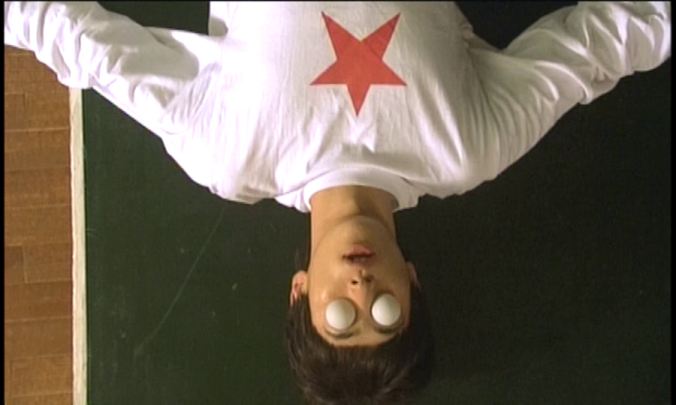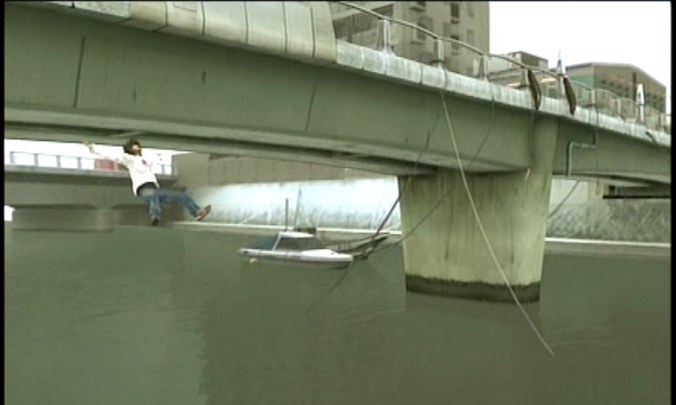 Japan hadn’t had a sports movie as successful as Ping Pong since Sumo Do, Sumo Don’t, and I was expecting a similar movie about an underdog team that eventually triumphs. Instead, I found a movie about friendships and character development, told in the flamboyantly entertaining manner of Hong Kong’s better known but later Shaolin Soccer.
Japan hadn’t had a sports movie as successful as Ping Pong since Sumo Do, Sumo Don’t, and I was expecting a similar movie about an underdog team that eventually triumphs. Instead, I found a movie about friendships and character development, told in the flamboyantly entertaining manner of Hong Kong’s better known but later Shaolin Soccer.
Peco and Smile are high school best friends in a relationship that began when Peco introduced Smile to ping pong during elementary school. Smile earned his nickname by never smiling, but he has become a very good if stoic player. Peco by contrast is utterly egotistical and flamboyant, a ping pong hustler, a colorful, often comic player and an arrogant winner whose goal is a national high school championship and a move to Germany where he can play professionally.* However, two things stand in his way – a school that has brought in a transfer student from Shanghai and the team from Kaio school who dress in black, shave their heads, and act like yakuza when around other players, led by “Dragon.”
Though we see the boys spend much time together, it is the standard dramatic case of “opposites attract.” We learn nothing about the homes of the two, nor do they share any thoughts about anything other than the game, with Peco doing almost all the talking while Smile works on a Rubik’s Cube. Eventually, we will learn that Smile could be the better player, for he is a boy with a natural talent who just lacks the killer instinct. This is a great frustration to both his high school coach “Butterfly Joe,” who had lost the national tournament as a student for the same reason when he was playing a friend whose knee was injured, and of the woman known as “Granny” who runs the shabby ping pong “dojo” in the neighborhood where Peco does his hustling.
Peco is humiliated in a pick-up game with “China” and then again in the tournament by the #2 on the Kaio squad. He burns his paddle, and eventually attempts suicide but swims out of the river and goes back to Granny to start over. Now we are in samurai world, with Granny acting as an eccentric priest for Peco as a modern Musashi Miyamoto, while Butterfly Joe builds Smile into the leader of the team. A member of the Kaio team is even thrown out of the “clan” when he plays and loses a personal, non tournament duel with Peco. Though there is a very brief bit about teenaged girls with crushes on star players, the casts seem to operate in an all male world without any distractions related to sex, nor do we ever see mention of actual classes. The ping pong paddle is their new katana.
We spend a lot of time on the ping pong games themselves, but director Fumihiko Sori isn’t just following the bouncing ball. We are treated to spectacular leaps, amazing shots, and even games floating off into an empty world. As pure entertainment, the games could hardly be improved. And, as must happen in any such movie, ultimately the final round in the next year’s nationals pits Peco v. Smile, but this is the game we do not see, cutting immediately to some time later with only a photo on Granny’s wall to tell us how it turned out.
All of this was based on a manga by Taiyu Matsumoto, who had also provided the source for the entirely different high school drama Blue Spring. Sori had begun his career in special effects and that shows in the spectacular exaggeration of almost all the scenes. For the most part, the movie is about the effects,  surprisingly applied to ping pong rather than to some great sci-fi spectacular. It turns out to be not quite the formulaic sports story of the underdogs somehow coming through to success but about finding one’s true nature. Nothing profound is provided on that topic, but it is a lot of fun while it’s on the screen.
surprisingly applied to ping pong rather than to some great sci-fi spectacular. It turns out to be not quite the formulaic sports story of the underdogs somehow coming through to success but about finding one’s true nature. Nothing profound is provided on that topic, but it is a lot of fun while it’s on the screen.
* Despite the game’s popularity in Japan, it seems to have had no professional league at the time, though it now does. At the international level, of course, the game was dominated by China.



Pingback: Swing Girls / Suwingu garuzu (2004) | Japanonfilm
Pingback: Ichi (2008) | Japanonfilm